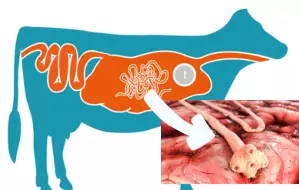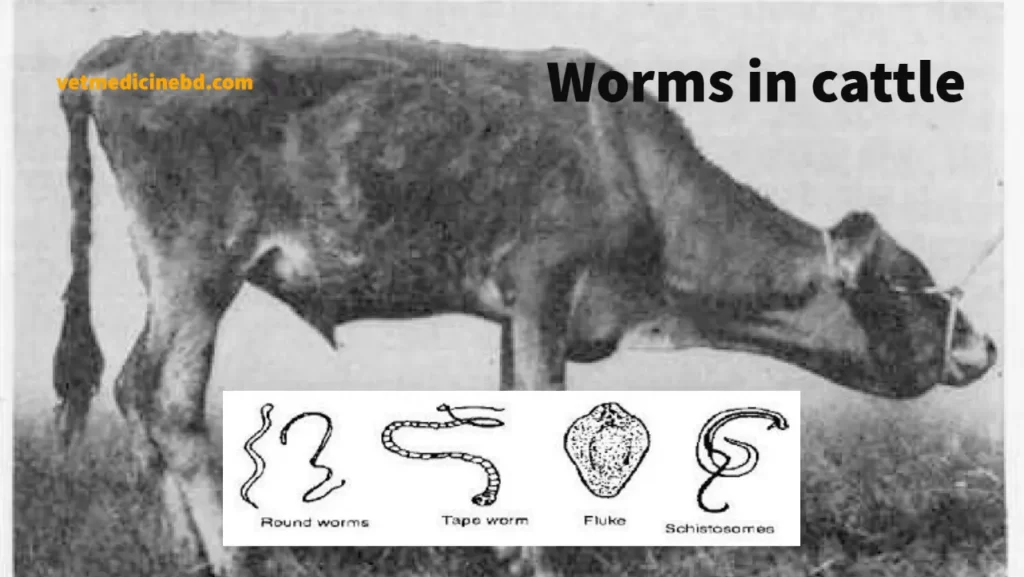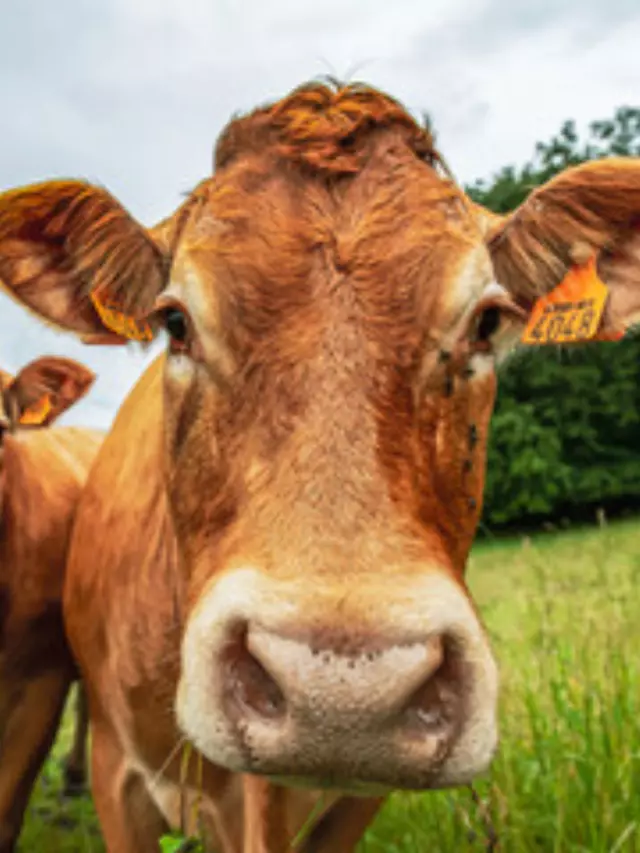Worms in cattle: Treatment & Medicine. Roundworm, Liver flukes, Tapeworm, There are many more varieties of worms in cattle. Basically, these three are more harmful. There are many types of worm medicine available on the market and we often do not know which medicine to take. So an idea was given in this regard. Here we will discuss 4 types of worm medicine. Using which we have got good results.
The names of the medicines that we will mention here are common generic names that you will find under different names of different companies but the generic names will always be the same. If you show these names in any pharmacy, they will hopefully give you the right medicine.
Table of Contents
Worms in cattle
- Roundworm,
- Liver flukes,
- Tapeworm
Types of worm medicine in cattle
- Albendazole- Liver flukes, Tapeworm.
- Triclabendazole 5% and Ivermectine 0.1%- Immature & Mature liver fluke [Fasciola gigantica and Fasciola hepatica], Roundworms, Lungworms and Nasal Bot.
- Levamisole Hydrochloride & Oxyclozanide- Small flat type worms (Fluke)
- Closantel Sodium Dihydrate- Liver fluke, Roundworm, Lice.
Worm medicine in Baby of goats and sheep
- In the first month: Albendazole [Jan, Apr, Jul, Oct]
- In the second month: Triclabendazole 5% and Ivermectin 0.1% [Feb, May, Aug, Nov]
- In the third month: Levamisole Hydrochloride & Oxyclozanide [Mar, Jun, Sep, Dec]

In this way, worm medicine should be given periodically. If you notice the months mentioned next to it, you can understand.
Adult goats deworming
- In the first month- Triclabendazole 5% and Ivermectine 0.1% [Jan]
- In the fifth month- Levamisole Hydrochloride & Oxyclozanide [May]
- In the ninth month- Closantel Sodium Dihydrate [Sep]
- Within 20 days after five days of childbirth- Albendazole.
Adult Patha and Khasi
- In the first month- Triclabendazole 5% and Ivermectine 0.1% [Jan]
- In the fourth month- Levamisole Hydrochloride & Oxyclozanide [Apr]
- In the seventh month- Closantel Sodium Dihydrate [Jul]
- In the tenth month- Albendazole [Oct]
All goats or sheep above 3 months of age should be given medicine according to the adult list. However, the amount of medicine should always be based on the weight of the goat.
Animal parasites / Worms in cattle
Invasion of parasites (Worms in cattle)
No cow can be found in our country which is not attacked by worms. The climate of our country is very beneficial for causing worm diseases. In Bangladesh, 100% worm infestation can be observed in cattle and farms suffer a lot of damage due to worm infestation. Attacks of roundworms, tapeworms, and leaf worms are more common.
Symptoms
When the worms attack cattle, the animal dries up day by day. He doesn’t eat much. Milk production decreases, the animal suffers from anemia, thin stools, animal fur does not have a shiny feeling, indigestion, enlargement of the stomach, occasional abdominal pain, etc.
Treatment
Cattles can have many types of worms. Therefore, deworming should be used if it is effective for almost all types of worms in cattle. For example, Ivermectin group medicine for 50 kg should be given 1 ml under the skin. It works great for all types of worms. Ivermectin group drugs work well in all cases of roundworms, leaf worms, tapeworms, and parasites in cattle.
Triclabendazole+levamisole) Give it 1 for 75 kg. or Albendazole can be given.
If you can detect if your animal is infected with any worms through a dung test or any other means then it is better to give specific treatment. Here you can give medicines of Nitroxynil, Albendazole, and Triclabendazole group for liver worms in cattle.

For lungworms
Fenbendazole, Albendazole, and levamisole Can be given as group medicine। The calf can be given levamisole, piperazine citrate, and fenbendazole group drugs to get rid of the worms. It is better not to give deworming to the calf before the age of 40-45 days.
After de-worming the animal, flavors such as zymogen, Digital, Rumen plus, Anora, Roxyvet, or more that are available in the market give it a taste of food. In addition, you can give vitamin injections.
Some general rules for feeding worm medicine
- It is better to give worm medicine on an empty stomach in the morning.
- It is better not to feed in extreme heat.
- Feeding should not be given 12 to 24 hours before giving anthelmintics and 2-4 hours after giving anthelmintics.
- The best time is in the morning, which means a total of 12 hours on an empty stomach from the night before to the next morning.
Deworming of pregnant animals
- It is best not to worm medicine the animal within 45 days of breeding.
- Pregnant goats can be dewormed. In this case, you can give Felbendazole group tablets and an Amectin Plus injection. Safe during any pregnancy. Venazol Vet is safe for pregnant women over 2 months pregnant.
- However, the last time an animal that was pregnant was not given deworming. Anthelmintics will not work if their normal dose is lower.
- Refrain from giving worm medicine to goats for at least 45 days after calving. This will reduce milk production.
You can also read- Bloating in cattle: Treatment and prevention


